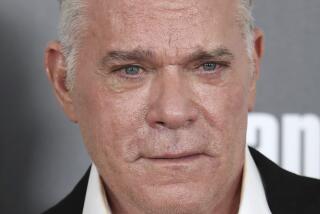Review: ‘Author: The JT LeRoy Story’ lets a hoaxster speak rivetingly in her own words
In the decade since she was outed as the mastermind behind the one-time literary phenomenon JT LeRoy, the San Francisco-based writer Laura Albert has been called many things: fraud, disgrace, con artist, pathological liar (her own words, that last one). It’s telling that in his rich and thorny new consideration of the LeRoy saga, director Jeff Feuerzeig has chosen to lead with the less damning designation of “author.”
The title refers less to Albert’s much-disputed writing talents than to her creation of her own rise and fall — born of a compulsion to warp her life, her art, her traumatic past and personal recovery into the most duplicitous and all-consuming kind of fiction.
That makes it hard to approach “Author: The JT LeRoy Story” without wondering if the film is meant to be an apology for Albert’s charade, a defense of it, or even an extension of it — the cinematic equivalent of the self-justifying books written by disgraced fabulists like Stephen Glass and Jayson Blair. The strength of Feuerzeig’s movie is that it doesn’t pretend to know the answer. You may well question the worth of a documentary that so fully embraces the perspective of a narrator this unreliable, just as you may crave the reassuring conventions of a more balanced filmmaking approach. But even for those who don’t regard the notion of perfect objectivity with the wariness it deserves, there are compensatory insights in this movie’s unapologetic fascination with its subject.
Feuerzeig waives the filmmaker’s right to judge or even criticize, and he shuns the chorus of talking heads that would substantiate or refute the particulars of Albert’s account. (For that, you should seek out Marjorie Sturm’s equally absorbing 2015 documentary, “The Cult of JT LeRoy,” which takes a much harder view of Albert and is this film’s logical companion piece.) His approach is predicated on the notion that Albert’s voice, full of revealing digressions and contradictory perspectives, contains the multitudes that we seek.
Of the many versions of Laura Albert introduced in the course of “Author,” the most sympathetic is the one we glimpse in old photographs and home movies from her early life in Brooklyn, presented alongside a familiar-sounding chronicle of parental negligence and various mental-health and body-image issues. It was during one of Albert’s many calls to a suicide hotline, always under a fictional guise, that the imaginary 15-year-old who would come to be known as Jeremiah “Terminator” LeRoy emerged. Amazingly, he stuck, and with a tenacity that Albert claims to have been surprised by.
Addressing the camera directly and lucidly throughout, her arms often moving in lively counterpoint to her words, Albert claims that, for her, LeRoy was never a hoax, but rather a lifeline and a source of creative liberation.
“Let ‘Terminator’ write,” she decided, and the stories that poured forth in his voice colored in the lines of a truly monstrous childhood. Born to a West Virginia truck-stop prostitute, LeRoy endured cycles of poverty, sexual abuse, drug addiction, forced cross-dressing and other horrors — all of which he recounted in the sort of harsh, lyrical prose that drew acclaim and fame in literary circles and beyond.
Once LeRoy was in the world, of course, he had to be kept alive, and “Author” approaches the dizzyingly elaborate proportions of a bedroom farce as Albert recalls how she turned a non-existent recluse into a living, breathing person — impersonated on the phone by Albert, and in the flesh by her sister-in-law, Savannah Knoop, whose boyish looks and shy demeanor were a perfect fit for this androgynous, psychologically scarred character.
As LeRoy began attending readings and befriending celebrities, Albert tagged along as his friend and manager, Speedie, adopting a British accent and keeping the charade going with masterful dexterity. (Also in on the act: Albert’s rock-musician husband, Geoffrey Knoop.)
Besides securing Albert’s on-screen participation, the director’s greatest coup is his access to her treasure trove of phone calls, meticulously recorded and brilliantly sampled here in excerpts that add to the film’s labyrinthine layers of identity. We hear Albert as LeRoy chatting it up with Gus Van Sant, whose “My Own Private Idaho” she claims as an inspiration for her work and who hired her to write an early draft of his film “Elephant.” (He wasn’t the only high-profile Hollywood figure to offer her a writing gig, we later learn.)
We hear her confiding in Billy Corgan, who remained a close supporter and sounding board even when she confessed the truth to him early on. There’s a hilarious moment when Courtney Love pauses mid-call to snort “a really small line of coke,” and an ironic one when Albert recalls LeRoy getting the famous “Bono talk” backstage at a U2 concert, warning him against the potential pitfalls of celebrity.
The documentary’s juiciest chapter follows LeRoy and his entourage to Europe for the filming of “The Heart Is Deceitful Above All Things,” Asia Argento’s adaptation of LeRoy’s 2001 short-story collection. Albert’s recollection of how the Italian director-actress treated her and Knoop behind the scenes of that Cannes-bound train wreck is savagely entertaining and all too believable. Even at the height of her deception, Albert notes, she was still cast out, marginalized by her own ingenuity, unable to enjoy the fruits of her authorship.
Boo-hoo, you may think. But sympathy isn’t the same thing as exoneration, and without going so far as to vindicate its subject, “Author” channels our scorn in a less obvious direction. Its true target — hinted at in the opening footage of Winona Ryder introducing the writer at an event (“You are an inspiration!” she gushes) — is the subtler fraudulence at the heart of the celebrity-driven sob-story culture that allowed JT LeRoy to thrive.
Why are we such suckers for miserablism in entertainment, so quick to assume a link between suffering and artistic worth? Does a book identified on its cover as “fiction” — as Albert notes that all her books have been — gain merit or interest simply because it might be semi-autobiographical? Isn’t our tendency to over-praise the young, precocious and damaged just a slippery form of condescension? The film supplies no direct answers to these questions, perhaps because it suspects we can guess them already. We believed Laura Albert’s lies about herself, in part, because she knew some none-too-flattering truths about us.
------------
‘Author: The JT LeRoy Story’
MPAA rating: R, for language throughout, sexual content, some drug material and violent images
Running time: 1 hour, 50 minutes
Playing: Arclight Cinemas, Hollywood
See the most-read stories in Entertainment this hour »
Movie Trailers
More to Read
Only good movies
Get the Indie Focus newsletter, Mark Olsen's weekly guide to the world of cinema.
You may occasionally receive promotional content from the Los Angeles Times.







